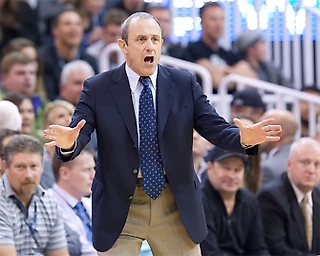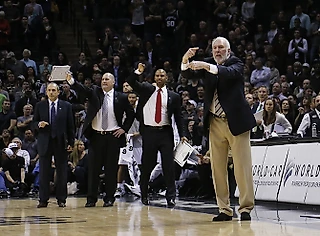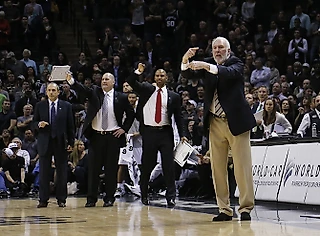What it takes for a youngster to play in a top team
Before the game with Saint-Petersburg I told my young players that this game would be much more difficult for them as compared to our battle with TAU. They looked at me surprised and I explained that in Vitoria they were expected to play a few minutes and make mistakes due to an incredible energy and great talent of our opponent. The spectators, myself and even the teammates weren’t expecting a lot from them. They entered the game for four-five minutes without any kind of pressure and all of them scored at least one basket. They played very carefully. Everybody was very happy for them.
In Superleague there is a rule to use at least two Russian players on the court at the same time. In this game we were expecting them to help us out. We needed them to make up for the loss of Savrasenko as some of our leaders needed some rest after an important game in Vitoria. As a matter of fact our leaders once again played very good game against Spartak, even though Trajan and David had lower field goal percentage than usual. Our young players’ performance (with the exception of Anatoly Kashirov who had 6 points and 4 rebounds in 14 minutes) was disappointing.
Let’s make an assumption. These kids are physically and technically ready to play at this level. So it’s only a matter of mental preparation, mental work, which makes an incredible difference. Young players depend heavily on their performance. They are greatly inspired by good performance and greatly frustrated by bad one. They don’t understand because of their age that to become good players they should be consistent night in and night out. At our level we cannot afford playing one great game and poor second one. We must play the second game at least at a medium level.
If you are a youngster playing in a top team, you’ll always have your chance because the attention of defense will be focused on key players of your team. So you can contribute if you try to play defense, rebound and shoot when you’re open. There will be plenty of moments when your defender will leave you open while helping his teammates. In such moments you need to be extremely determined to shoot. You shouldn’t waste your time on thinking when you are open. It will only cause mistakes. You also need to be a decent outside shooter, because what defense will give first and foremost is a jump-shot. You will rarely have an opportunity to penetrate.
Unfortunately, most young players don’t understand the importance of developing a reliable jump-shooting ability. They rely more on their dribble penetration or some strange moves. It’s funny that most young American players who come to Europe experience exactly the same problem. They think that with their jumping ability, their ability to penetrate with the ball, they can resolve a lot of offensive situations. They don’t understand that at our level the defense will first give them a jump-shot. Only then, if you prove being a decent shooter, they will be aggressive and this will open to you some space for dribble penetration.
One more reason it’s tough for young players to play in a top team is that the importance of every possession is extremely high. In medium level teams, they can afford more mistakes and you’d stay on the court for many more minutes, because they can afford more losses. In a big team, like ours, this is not possible.
In Italy and Spain in last 10-15 years most kids, who advanced from a young star to a professional star, were playing in medium level teams. It’s a very rare for a great young player to be developed in a big team, because it’s very difficult for him to get enough playing time there. Let me give you some examples. Rudy Fernandez is playing in Badalona which is a good team, but it’s not Barcelona or Real Madrid. Danilo Gallinari is playing in Milano, which is also a medium level team. It was different for Andrea Bargnani. He was not only extremely talented, but physically and mentally ready to play in a championship caliber team, like Benetton. However it’s quite an exception. Most stars of 70s like Roberto Brunamonti and Antonello Riva grew up in medium level teams, where they had more chances to play and learn through making mistakes.
Most young players who I worked with in CSKA had a very hard time to stay competitive at practices and to fight for minutes for two reasons. Sometimes they have too much respect for the veteran players. Sometimes deep inside they don’t believe that even if they perform well they will be given playing time anyway. They develop a mentality of practice players. That means that sometimes they are not ready when it’s time to enter the real game.
However there are exceptions. I like the way Alexey Shved has worked for last several weeks. He was the most competitive among our young players in practice and if he continues to work the same way, I think, his moment will come. The only way for a young player to become consistent is to discipline himself on and off the court as well as improve his defensive mentality which is close to zero most of the time.
Another important thing about young players, they have no idea what defense is. It’s really disappointing that even when they get to our level they have no idea about being aggressive in defense. Unfortunately, the defense is not the strongest side of most Russian players. You can see this in most young russian players playing in Superleague and national junior teams. They are very talented offensively, but most of them lack two things, in my opinion: aggressiveness in defense and ability to pass on offense. Defensive drawbacks make it difficult for our young players to get more playing time. In CSKA you need to play good defense to be given some minutes.
As a young player you will never have the opportunity to score many points if you give up defensively. No matter what offensive skills you might have. For you to get playing time, I should not be afraid of putting you on the court in a big game. Even if you defend a bigger, stronger and more experienced opponent, you should at least try to deny him. Unfortunately, it’s very common for young players to just accept the way things are and not even try to dictate their game to the opponent. And then they have all alibis in the world, all sorts of excuses.
Every time when a young player comes up with a good game, he receives a lot of attention from the media, which I think is very important. But to be a good player they must immediately put this game behind them. The most difficult game is always the next one. It’s not occasional breakthroughs that count, but consistency does.
The truth is that out of 10 young players you have only one may become a good player. Everything depends on their aggressiveness, determination, being ready mentally and physically. There is a point where a coach can do nothing. I can try to push them, to provoke them, but still it will be up to them whether they become consistent players.
30, 20 and even 10 years ago players didn’t have one hundredth of what they have now in terms of conditions, salaries and attention from the media. They struggled from morning till night to improve their game, because becoming good player might change their life for better. Back then there was much more hunger to become somebody in terms of basketball. Obviously, we cannot recreate that situation. We should find another way to get to their minds, maybe by challenging their ego and their values. By helping them to understand that they cannot always find excuses for their bad performance, that they need to find the courage to say: “That’s it. I played bad. I didn’t prepare myself. I didn’t play because I wasn’t ready enough” instead of always blaming coaches, teammates or bad luck. The only thing we can do as teachers is helping them to grow mentally. However the ability to accept responsibility with young players is very poor. Not only in Russia, but almost everywhere.
If you force them to work 6 hours a day, they’ll work 6 hours. But! I’ve never seen most of them in the gym working extra before or after practice unless I told them so. Sometimes it seems that they work for me, not for themselves. It’s been absolutely the same in Italy. The ones, who are different, love the game, have fierce determination to improve their game — become stars. That easy, that simple.





